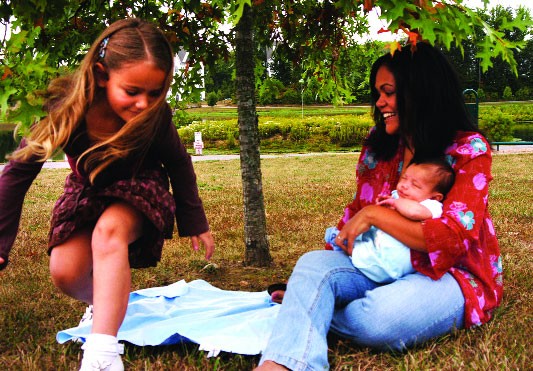
Michelle Blackmon, 24, is one of many university students juggling parenthood and studies. It is tough for her to find day care for her children, Alorah, 6, and Kaleb, one month.
Every Tuesday and Thursday, like many other university students, senior Kristin Reel, 24, battles with traffic for 45 minutes to get to the campus.
Unlike most, though, Reel makes a special stop en route to drop off her two daughters at her mom’s house in Rockville: Kailee, 3, and Taylor, 11 months.
Reel said she needs more help looking after her daughters. Her husband, Nathan, 28, helps out when he’s not working his full-time job at a Rockville-based marketing firm. She takes the kids to her mother’s, but her mom gets easily worn out because “they’re a handful,” Reel said. And, she added, her mom has a life outside of the two kids, including a job.
The problem: “Day care is definitely not readily available on campus,” Reel said.
In 2003, the Division of Student Affairs was developing a plan to have a child care center on the campus by 2004. But two years later, there is still no day care center and officials said there are currently no plans to build one. There wasn’t enough funding, said Pat Mielke, assistant vice president for student affairs.
The only child care option on the campus is the Center for Young Children, which is run as an academic program, not a day care center, and has a constant waiting list.
Initially, the university explored a private-public partnership similar to the agreement with contractors who built South Campus Commons but found the university couldn’t afford construction costs because of budget cuts, Mielke said.
The university owns land across from the Metro station that comprises Research Park, also known as M Square. The university explored “opportunities to partner with agencies that might be attracted to Research Park,” Mielke said, and “as our fiscal position begins to improve, we may be at a point where we’ll ask that question of whether or not we can afford it.”
In the meantime, the university is trying to make other accommodations for student parents. A 1999-2000 profile of undergraduate students in U.S. postsecondary education institutions completed by the U.S. Department of Education found 27 percent of undergraduates were parents. Statistics for students at the university who are parents aren’t available because applicants aren’t obligated to note whether they have children, said Beverly R. Greenfeig, co-coordinator of the Returning Students Program, which counsels students returning to school, including after having children.
The Women’s Commission, started by the administration to help advocate women’s issues on the campus, created a task force to address student/parent issues, including adding changing tables in bathrooms and highchairs in the dining halls.
“Our goal is to provide a clearing house of information” for student parents, said Cynthia Hale, chairwoman of the Women’s Commission.
Child-care systems at other schools, such as the University of Michigan, Johns Hopkins University and Pennsylvania State University, are being used as models, said Marta McClintock-Comeaux, a graduate student and member of the Women’s Commission, who has a 1-year-old son. Mielke said these schools can offer child care centers because of large private subsidies they receive.
Michelle Blackmon, 24, lucked out when her daughter turned three and another family canceled at the Center for Young Children. Her daughter spent three years in the program while Blackmon pursued a theatre degree. Although Alorah, 6, now attends public school, Blackmon still has to find child care for her infant, Kaleb, born last month, when she returns to finish her degree next spring.
“No matter what it takes, I will find a way to go to school,” she said. “If anything, just to say I did, because so many people told me I couldn’t,” Blackmon said.
“It’d be nice to have a drop-off day care center on campus, like the services they offer at gyms,” she said.
Reel agrees.
She wakes up each morning at 6 a.m. with Taylor, making scrambled eggs and bacon, pancakes and Kix cereal for breakfast. She leaves school by 4:30 p.m., picks up her kids then goes home, studying after she puts her daughters to bed.
Reel is looking forward to graduating in May, which will have taken her six years.
She said she’ll make due with life as it is, because in the long run, “Graduating’s more important to me than not.
“My education is not any less important than yours just because I have kids.”
Contact reporter Brianna Bond at newsdesk@dbk.umd.edu.



